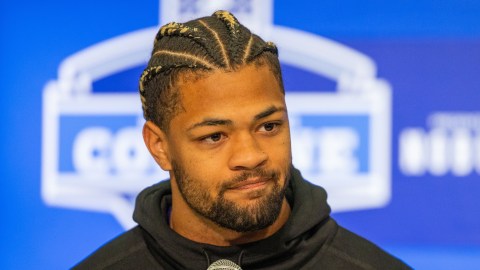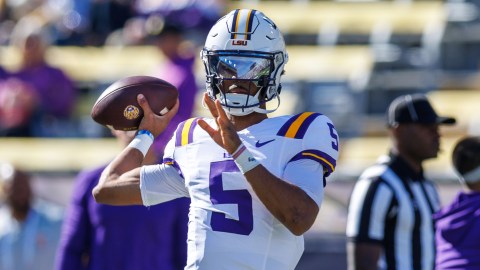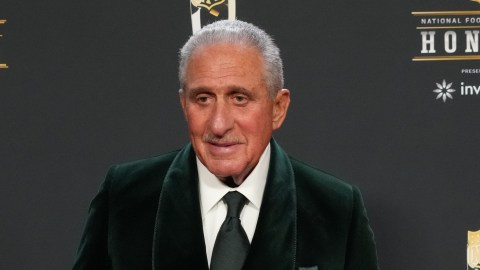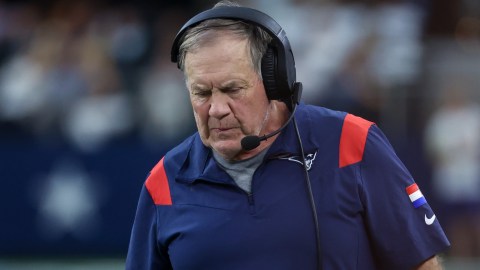 In 2012 alone, there have been nine suspensions handed out to players for violating the NFL’s performance-enhancing drug policy. That’s up from just four in 2011, and two of those suspensions were from positive tests that dated back to as early as 2008.
In 2012 alone, there have been nine suspensions handed out to players for violating the NFL’s performance-enhancing drug policy. That’s up from just four in 2011, and two of those suspensions were from positive tests that dated back to as early as 2008.
The NFL has suspended Jordan Black, Brandon Browner, Brandon Bolden, Jermaine Cunningham, Aqib Talib, Joe Haden, Eric Wright and Brody Eldridge for four games apiece. Richard Sherman was also given a four-game ban, but he is fighting the ruling with an appeal set for Friday. For years, Major League Baseball was embroiled in performance-enhancing drug controversy, but that’s now swaying to the NFL. The difference, though, is no one seems to care.
In professional baseball, alleged steroid use can keep you off numerous Hall of Fame ballots and even playoff rosters. It casts a shadow over a player’s entire career, regardless of what he tested positive for. The debate is raging on again now because Roger Clemens, Barry Bonds and Sammy Sosa are on their first Hall of Fame ballot. Two of those players are no-brainer Hall of Famers, and are among the best players to ever take the diamond. To leave Bonds out of the Hall of Fame would be like leaving Babe Ruth out. Unfortunately, Bonds allegedly used steroids, even though the game wasn’t testing for them for most of his career.
In the NFL, a positive test for Adderall counts just as harshly as a positive test for human growth hormone or injectable steroids. That is one cause for the double standard that exists between the two sports. When Giants outfielder Melky Cabrera tested positive for high levels of testosterone, everyone immediately assumed the worst — Cabrera’s career-best season was tainted beyond repair. But when Jermaine Cunningham — in the midst of his best season as a pro — violated the NFL’s PED policy, he could just turn to the go-to excuse that Adderall sparked the positive test, and no one cares to question that.
Rodney Harrison was suspended for using HGH in 2007. Harrison is a borderline case for the Hall of Fame as it is, but that positive test likely won’t weigh on voters’ minds like that of Bonds, Clemens, Sosa, Alex Rodriguez, Manny Ramirez or Mark McGwire.
In baseball, even assumed steroid use, with no proof or allegations whatsoever, can keep you from post-career honors. Jeff Bagwell has fallen short of the required 75-percent vote two years in a row. His career achievements, including an MVP, NL Rookie of the Year, four all-star appearances, 449 home runs and a .948 OPS (22nd all time) all suggest he’s Cooperstown-worthy, and should have been on his first ballot. Mike Piazza may be the greatest hitting catcher in the history of baseball. But both players seem like a steroid users. So Bagwell was left off numerous ballots in 2010 and 2011 and the same is likely going to happen to Piazza.
The Patriots have three players suspended for PEDs this season alone. They traded for Talib, who was suspended for “Adderall” while with the Buccaneers, and Bolden and Cunningham were both with New England when they were suspended. No one is up in arms about the 10 victories the Patriots have accumulated this season. No one is looking at this season as tainted, and if those players achieve Canton-worthy greatness during the course of their careers (highly doubtful) no one will keep them from enshrinement because of four lost games because of “Adderall.”
Maybe it’s because NFL players are so big, so strong and so inhuman that casual fans just assume that they’re on steroids anyway or simply don’t care if it makes them better athletes. Maybe it’s because there isn’t the same sanctity surrounding the NFL as there is in baseball. Maybe it’s because the numbers don’t matter as much. There’s no equivalent to the 755 home runs that Hank Aaron hit or the 61 home runs that Roger Maris hit, or even the 660 home runs that Willie Mays hit — all figures that your typical baseball aficionado could rattle off — in the NFL.
Baseball is also about as individual of a sport as you’ll see. It’s batter versus hitter or batter versus fielder, or sometimes even player versus umpire. The relationship between a catcher and pitcher or a second baseman and shortstop turning a double play is about as close to the degree of “team” as you’ll find similar to that in football. Every football player — especially on defense — has a singular role that combined with 10 other players makes the unit complete. Because it can be difficult to single out a left defensive end, or a nickel cornerback or a third-down running back, their achievements become less notable. And if they’re being helped by performance enhancing substances it matters less.
There shouldn’t be a double standard, though. PEDs are banned because they’re dangerous and unfair. The NFL should start announcing what players tested positive for so they stop hiding behind “Adderall.” The NFL started testing for steroids 16 years before Major League Baseball. And while announcing that some of the league’s most talented players are playing under banned substances may tarnish the league’s reputation, it will at least clean up the game.
If anything, some middle ground must be found between the two sports. Baseball players shouldn’t be punished for taking steroids before there were tests, and they certainly shouldn’t be punished if no evidence exists that they ever used banned substances. And football players should be held more accountable for their actions, and the NFL needs to start announcing the results of positive tests, even if it means more criticism from the public.




